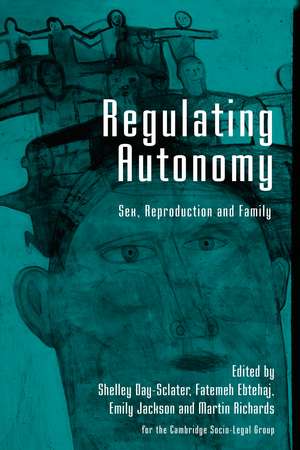Regulating Autonomy: Sex, Reproduction and Family
Editat de Shelley Day Sclater, Fatemeh Ebtehaj, Emily Jackson, Martin Richardsen Limba Engleză Paperback – 3 mar 2009
Preț: 465.74 lei
Preț vechi: 523.30 lei
-11% Nou
Puncte Express: 699
Preț estimativ în valută:
89.13€ • 92.71$ • 73.58£
89.13€ • 92.71$ • 73.58£
Carte tipărită la comandă
Livrare economică 14-28 aprilie
Preluare comenzi: 021 569.72.76
Specificații
ISBN-13: 9781841139463
ISBN-10: 1841139467
Pagini: 298
Dimensiuni: 156 x 234 x 15 mm
Greutate: 0.4 kg
Ediția:New.
Editura: Bloomsbury Publishing
Colecția Hart Publishing
Locul publicării:London, United Kingdom
ISBN-10: 1841139467
Pagini: 298
Dimensiuni: 156 x 234 x 15 mm
Greutate: 0.4 kg
Ediția:New.
Editura: Bloomsbury Publishing
Colecția Hart Publishing
Locul publicării:London, United Kingdom
Notă biografică
Shelley Day Sclater has been a lawyer and academic social scientist and now works as a freelance writer and researcher. She was Professor of Psychology and Law at the University of East London.Fatemeh Ebtehaj is an associate member of the Centre for Family Research, University of Cambridge. Emily Jackson is a Professor of Law at the London School of Economics and a member the Human Fertilisation and Embryology Authority, and the British Medical Association Medical Ethics Committee.Martin Richards is Emeritus Professor of Family Research at the Centre for Family Research, University of Cambridge.
Cuprins
1. Introduction: Autonomy and Private Life Emily Jackson and Shelley Day SclaterPart 1: Intimacies and Domestic Lives 2. Exploitation: The Role of Law in Regulating Prostitution Suzanne Jenkins3. Feminist Anti-violence Discourse as Regulation Helen Reece4. Relational Autonomy and Rape Jonathan Herring5. Rules for Feeding Babies Ellie Lee and Jennie Bristow6. Legal Representation and Parental Autonomy: The Work of the English Family Bar in Contact Cases Mavis Maclean and John Eekelaar7. Regulating Step-parenthood Jan Pryor8. Internet Sex Offenders: Individual Autonomy, 'Folk Devils' and State Control Julia Davidson and Elena MartellozzoPart 2: Reproduction 9. Regulation of Reproductive Decision-making Theresa Glennon10. Instruments for ART Regulation: What are the MostAppropriate Mechanisms for Achieving Smart Regulation? Martin H Johnson and Kerry Petersen11. Which Children can we Choose? Boundaries of Reproductive Autonomy Martin Richards12. Anonymity-or not-in the Donation of Gametes and Embryos Susan Golombok13. Autonomy and the UK's Law on Abortion: Current Problems and Future Prospects Laura Riley and Ann Furedi
Recenzii
My overall conclusions are that there are no weak contributions here, that I learnt a lot, had my mind changed occasionally [and] was led to thinking about some - important - matters for the first time
...the book as a whole is thought-provoking and challenging, with a mastery of detail and argument that is so often lacking in public debate today...the breadth of subjects discussed and the fact that many of them are familiar from popular discussions make it a fascinating read. It provides insights into both the reach and the limitations of the law in dealing with intimate life and raises important questions about the way in which autonomy has become subject to doubt, both in its necessity and its possibility.Jan Macvarish
Many of the individual cases are thought-provoking and useful for scholars of family law, feminist legal theory, and autonomy. They raise many provocative questions about the relationship between autonomy and regulation by challenging the assumption that these two things are necessarily opposed to one another...The chapters are accessible and could be useful in an undergraduate or graduate course on gender and law or family law.
The essays analyse how much intimate relationships and reproductive decision-making should be affected by the law, regulation and social policy. The collection will therefore appeal to legal scholars, social scientists, biochemists, and policy makers alike.This collection of essays engagingly discusses the intersection of autonomy and regulation in private decision making. the essays are all of high standard and . the book makes a good contribution to its field.
...the book as a whole is thought-provoking and challenging, with a mastery of detail and argument that is so often lacking in public debate today...the breadth of subjects discussed and the fact that many of them are familiar from popular discussions make it a fascinating read. It provides insights into both the reach and the limitations of the law in dealing with intimate life and raises important questions about the way in which autonomy has become subject to doubt, both in its necessity and its possibility.Jan Macvarish
Many of the individual cases are thought-provoking and useful for scholars of family law, feminist legal theory, and autonomy. They raise many provocative questions about the relationship between autonomy and regulation by challenging the assumption that these two things are necessarily opposed to one another...The chapters are accessible and could be useful in an undergraduate or graduate course on gender and law or family law.
The essays analyse how much intimate relationships and reproductive decision-making should be affected by the law, regulation and social policy. The collection will therefore appeal to legal scholars, social scientists, biochemists, and policy makers alike.This collection of essays engagingly discusses the intersection of autonomy and regulation in private decision making. the essays are all of high standard and . the book makes a good contribution to its field.
Descriere
These essays explore the nature and limits of individual autonomy in law, policy and the work of regulatory agencies.
